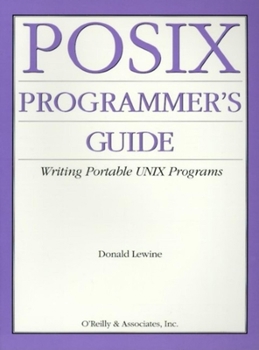POSIX Programmers Guide
Select Format
Select Condition 
Book Overview
This guide, intended as an explanation of the POSIX standard and as a reference for the POSIX.1 programming library, helps you write more portable programs. Most UNIX systems today are POSIX compliant because the federal government requires it for its purchases. Even OSF and UI agree on support for POSIX. Unfortunately, given the manufacturer's documentation, it can be difficult to distinguish system-specific features from those features defined by...
Format:Paperback
Language:English
ISBN:0937175730
ISBN13:9780937175736
Release Date:May 1991
Publisher:O'Reilly Media
Length:640 Pages
Weight:2.30 lbs.
Dimensions:1.3" x 7.0" x 9.2"
Customer Reviews
5 ratings
Best Way to Write Portable Programs
Published by Thriftbooks.com User , 22 years ago
For many programmers, interoperability is the name of the game. Write once, compile everywhere. Yes, compile, because a compiled program runs 80 times as fast as an interpreted program. Now comes the gotcha: different compilers come with different libraries. C source written for HP-UX might look different from C source written for Solaris, which might look different from C source written for AIX or Linux. What features of the language should we use? What library calls should we use? Answer: Use ANSI C with IEEE 1003.1 POSIX standard library calls. This gives you the most bang for your buck, because nearly all C compilers support these standards. Write your code on one platform, compile it on the other platforms. If you conform to the POSIX standard, you will minimize your porting headaches. Follow this book and you'll conform to the standard.
Guide for the Newbie, Reference for the Pro
Published by Thriftbooks.com User , 23 years ago
After 10 years of developing real-time software for DOS and embedded systems, I needed to develop software for the real-time O/S, QNX, a POSIX compliant O/S. Unlike DOS, QNX is a real operating system which demands a different programming paradigm. Without Lewine's book, I'm not certain I could have made the shift.This book may be too complicated for somebody unfamiliar with C programming. But, if you know the language, it provides all the basics to successfully create software on a POSIX system. The first half of the book elaborates on how to do things in POSIX. Lewine does not assume that the reader knows anything about UNIX. Plenty of example code clarifies the the theory. All the examples are heavily annotated. One cannot *not* learn the POSIX programming paradigm from this book.For real-time programming, information about POSIX.4 was needed, and I gleaned this from Gallmeister's PROGRAMMING FOR THE REAL WORLD POSIX.4, also an O'Reilly book. Once through these books, code began to flow from my keyboard. The QNX library manuals made far more sense. As an "expert" (I've been doing this for about 5 years), I still refer to the back of Lewine's book. The last half is a reference to the POSIX library functions. Although I haven't done much programming under LINUX, I presume this would be a useful reference for that O/S. The latter half of the book documents the function calls at least as well as any manual for a C programming library that I've ever seen. I've gotten to the point where this book mostly sits on my shelf--but it's comforting to know that when I can't remember the arguments for sigprocmask(), I can take it down and find the answer quickly.
Readable, informative, and well organized
Published by Thriftbooks.com User , 24 years ago
When I bought this book I never realized how handy it would be. Reading it from cover to cover is a pleasure but it's also very easy to use as a reference -- I've never spent more than a minute trying to find whatever I need. This book has saved me uncountable hours both while debugging software and while porting to various platforms.
Absolutely indispensable reference book
Published by Thriftbooks.com User , 25 years ago
I always keep this book within easy reach. It is the most complete, lucid, comprehensible, and valuable reference for portable C and C++ programming. If you stick to the rules of the standard POSIX C function calls, as clearly and precisely stated in this exceptuional work, your programs will be portable; otherwise, they won't. I almost never refer to the Borland or Microsoft C/C++ help files for explanation of function call parameters; this book is the bible, the final authority on what you can and can't do. I am certain that it is accurate across SCO UNIX, Open Server, Xenix and AIX, and I would bet a ton it's just as accurate for the other UNIX OS's. Besides being absolutely authoritative, its best feature is that you don't have to be a guru to understand it; it's written beautifully, logically, clearly. If you write cross-platform C or C++ programs, you MUST have this book. I'd be lost without it.
Best man pages of any reference book
Published by Thriftbooks.com User , 25 years ago
A very good tutorial and an excellent reference. I use the reference pages in the POSIX Prorgraamer's Guide for all of the normal library functions and I know my program will be portable.





